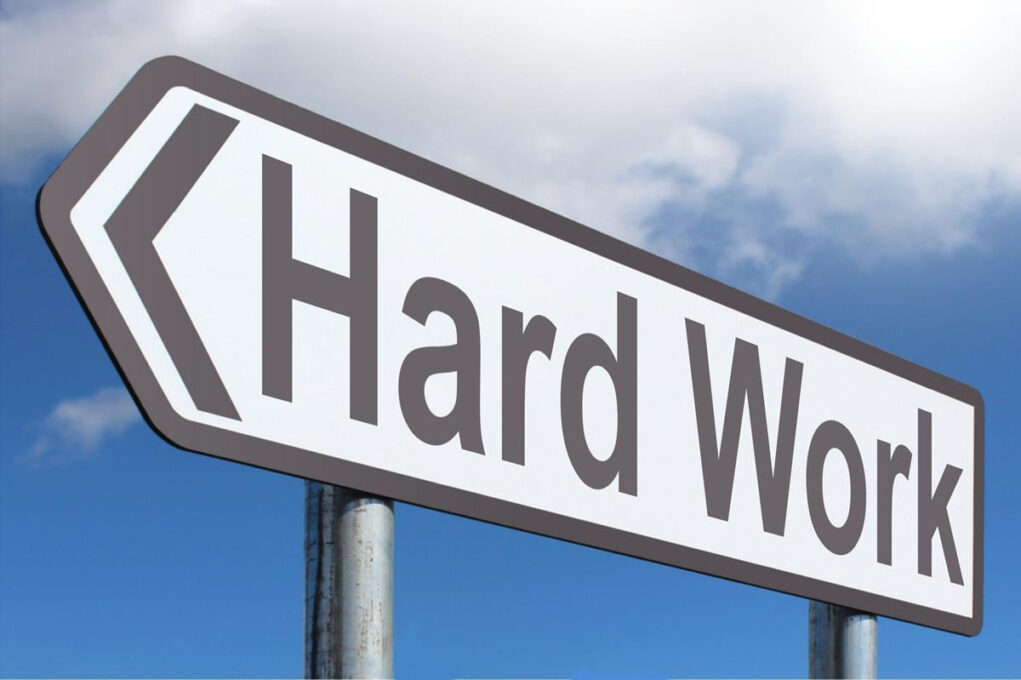In this post, we’ll examine the fascinating concepts of talent vs hard work in order for you to learn their merits and demerits. Out of curiosity, what comes to mind whenever you hear talent? Can you define hard work? Well, no need to scramble neurons. Let’s discover all the answers.
Definition of Talent
The Merriam-Webster Dictionary describes talent as any “athletic, creative, or artistic expertise.” It is an innate behavior, an inbred skill in a person that helps them perform admirably in a chosen field. An average person’s talent capacity is not limited.
Meaning?
Some people have one talent, others a dozen. For instance, a person might not only be good at ventriloquism (use a dictionary) but also contortion.
Generally, talent manifests itself in people through various manners like writing, playing sports, or a zeal for the arts.
In the workplace, “talent” is a lingo to describe those with a collection (or at least a shred) of well-developed general and social skills.
What do these mean?
General talents include;
- Language proficiency
- Mathematical skill
- Critical reasoning
- Learning abilities
Social talents are;
- Communication
- Collaboration
- Influence
- Social awareness
Does Everyone Have A Talent?
Personally (and research supports me), I would say yes, but the answer to that largely depends on how you define talent.
Everyone has strengths and weaknesses, formed on the backs of experiences and backgrounds so diverse you cannot begin to process the magnitude of it. When you view life from a non-objective angle, you realize everyone has a degree of talent for something, no matter how hard they try to downplay (or worse, ignore) their skills.
Talent VS Hard Work Clause #1:
Can You Build Talent?
Unfortunately, no. Talent is an innate behavior. That means inbred, something you’re born with. Either you have it or you don’t. For instance, let’s say you have that one friend in your group who believes they’re Elton John reborn, but in reality, sounds like a dying Pacman.

Would you say they have talent? (Don’t be modest.) Indeed, they could work to improve their skill, but if you’re talented at something, you will not naturally suck at it.
If you’re born without a particular talent, there’s a fair chance you might never become as good as you aspire to be.
However, does that make you hopeless?
Not by a long shot.
RELATED TOPICS:
Hard Work: The Basics

Here’s a bite of confusion for you to chew.
Hard work has no generally-accepted definition.
No, seriously. You can consult Google or a dictionary and read over a hundred meanings but the fact is your definition of hard work will only match your definition of success.
Let’s not fool ourselves. No one likes a consistent failure, not even the failure. Some will insist they employ sufficient hard work to achieve their goals. Others might seem satisfied with their current situation, and you might start to think laziness is their actual talent, but that (well, in some instances) may not be the case.
You just see it that way because their idea of success does not match yours.
SEE:
Define Hard Work
What is success to you?
An office promotion? A theater callback? A glass house?
Whatever it is, will you commit to working smartly and intensely to achieve your goal with utmost efficiency? Will you put consistent effort into your task, even with the world against you? With echoes of doubt in your wake?
If your answer is yes, I congratulate you.
You just defined hard work. You get a cookie.

But this is what others will not tell you. When you put a lot of effort into something that is neither a weakness nor a strength, it doesn’t always lead to success. Sometimes, hard work begets frustration, sometimes reflection, and other times depression.
Anyway, the point is, hard work does lead you somewhere, provided you’re willing to go the distance. And there are benefits (so many benefits) of hard work.
Imagine you have an exam in a week and you haven’t so much as breathed upon the first page of your notebook. Unless you have a hard drive locked somewhere with files that you can download directly into your spacious brain, you, my friend, shall fail with esteemed grace.
SEE: New Year Resolution: Why It Never Sticks
Can Everyone Work Hard?
Oh, dear reader. This one is for the masses. Whether elite or middle-class, whether qualified or not.
Unlike talent that favors select individuals, no one is born allergic to hard work. The slogan is “Come one, come all.”
So unless you have a severe disability or disease that inhibits motor and cognitive functions (acting, speaking, thinking) in your body, or maybe a serious case of laziness, you can do hard work.
And like I said, it will always lead you somewhere, even if that somewhere is a sculpted physique with six-pack abs like mine. Why are you scoffing? Have you seen me?

The Talent VS Hard Work Formula
Okay, gather around and let me teach you something. When it comes to achieving a particular task, at any place during any time, four laws govern the process and deliberate to deliver your result.
The four laws are;
- Talent + Hard Work → High rate of success
- No Talent + Hard Work → Fairly-certain chance of success
- Talent + No Hard Work → Modest rate of success
- No Talent + No Hard Work → Why are you even here? IYDGDFOHBIBACIYA.
The Laws Explained
As you see, a blend of Talent and Hard Work gives you the shortest route to success. There is nothing more passionate than working on a task you love and having a skill for it — a skill you’ve developed over time. Be it story-telling, dance-and-music, or even football; when there’s an inbred passion for it and you combine that with hard work, then you’ve got a hot date with excellence.
Believe me, underachievers everywhere will envy you. No one appreciates excellence more than a person who has never tasted it. This idea puts a fat hole in William’s dogma, but perhaps I digress.
Talent and No Hard Work give you a modest chance of success. Some would say talent isn’t enough without hard work but I strongly disagree. Talent alone is not useless. It has granted people many accomplishments.
Talent with no hard work is sometimes better than hard work with no talent. Argue with those who never mastered an instrument or skill despite eons of practice.
Now, you might misinterpret the previous paragraph as me saying hard work is largely hopeless.
No. Hard Work and No Talent will give you some ground in a competition, and maybe level the playing field. However, what it will not give you is an edge over those who not only possess the talent you lack but have also reinforced their talents with adequate hard work.
Talent VS Hard Work Clause #2:
No Talent and No Hard Work … I need not elaborate on the consequences of following such an absurd law because you are neither ignorant nor silly. Let’s move on.
SEE: America’s Got Talent: Watch Some Extraordinary Performances
Talent VS Hard Work
If rivalry had a pair of pioneers, it’d be these two.
Regardless, we insist these concepts work better hand-in-hand than as rivals. Hard work is more efficient when aligned with talent.
Basically, you must desire to do what you do. It’s difficult but not impossible, especially when you play by your strengths. Applying this simple process daily can fast-track your goals, similar to using an elevator while your peers are busy falling over themselves on the stairs.
When you like what you do, every day feels like an adventure instead of torture.
What Talent Won’t Give You
All the talent in the world won’t offer you greatness in your chosen career if you ignore the value of hard work. You might have often heard your mates use the term “smart work.” What’s that? Well, it doesn’t mean scams or those get-rich-quick schemes carefully constructed for the “naive and desperate.” Rather, smart work is hard work that requires more brain than brawn.
It is rare but possible that someone who works smartly in a particular area, utilizing their strengths, will perform better than someone with an average talent for that task.
SEE:
Does Talent Supercede Hard Work?
While I conclude that talent is important in any field, it would be remiss of me not to state a fact.
Hard work is just as important as talent, even more in some cases.
Hard work offers people golden opportunities that talent alone cannot give, especially when their skills are underdeveloped.
Pro-athletes who train rigorously for competitions are twice as likely to perform better than those with talent who do nothing but sit around all day, every day, their precious skills kept under lock and key by Mr. Comfort Zone.
Confront them, and they will idly tell you, “Oh, the competition? Pfft! Don’t sweat it, bro. I don’t need to train. Could totally score hoops in my sleep.”
Nine times out of ten, they score defeat.
Talent VS Hard Work Clause #3:
The Golden Rule: Know Yourself
Talent and Hard Work are equally important for any undertaking. If you have no idea what your talent(s) are, kindly take some personal time to study yourself. Usually, it involves a long period of self-reflection, journaling, and meditation.
I know. Yawn. But there’s a quicker way to discover yourself.
A personality test.
No, I don’t mean your zodiac. Take a simple personality test via this link. Doesn’t take more than 15 minutes. Learn your personality type. Know your strengths and weaknesses. Understand what inspires you, and what offends you. Study the pattern of your subconscious thoughts.
And … bingo! True awareness.
To Wrap Up
This is one benefit of self-awareness. Being self-aware is like reading a body manual; you discover all the layers inside yourself, the skill(s) at your disposal. Strengths you never knew you had.
Therefore, a bit of advice for you: discover those skills, sharpen them without ceasing and remain motivated.
With a balanced application of talent and hard work, success is a certainty. Maintain the process to stand out among your peers.
Quit thinking “Talent VS Hard Work” and start thinking “Talent Plus Hard Work.”
Be well.
If you have any comments or questions, let us know in the section below.





